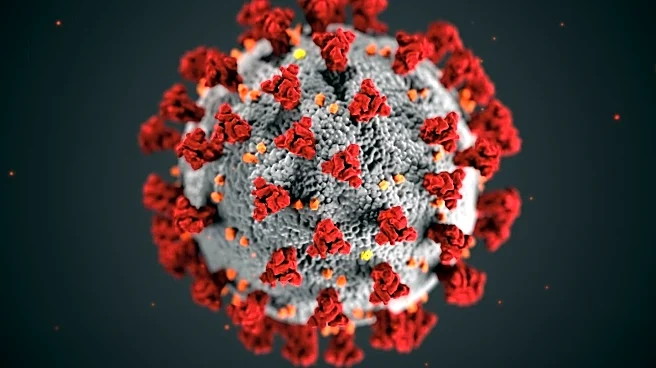What's Happening?
A study led by the University of Tübingen, in collaboration with Stanford University, Emory University, and Cincinnati Children's Hospital Medical Center, has revealed unique immune responses in infants
following SARS-CoV-2 infections. The research, published in Cell, highlights that infants and young children develop durable antibody responses lasting up to 300 days, contrasting with the more rapid decay seen in adults. The study involved collecting blood and nasal swab samples from infants and young children, as well as adults, to compare immune reactions. Findings indicate that infants exhibit robust mucosal immune responses, particularly in the nasal mucosa, characterized by inflammatory cytokines and interferon responses.
Why It's Important?
Understanding the distinct immune responses in infants is crucial for developing targeted vaccination strategies and treatments. The study suggests that infants' immune systems may offer insights into designing vaccines that leverage innate immune activation pathways, potentially reducing inflammation-related complications. This research could influence public health policies regarding vaccination schedules for infants and young children, ensuring better protection against COVID-19 and its variants. The findings also underscore the need for further exploration into the mechanisms behind the durability of infant immune responses, which could inform broader immunological research and healthcare practices.
What's Next?
The study opens avenues for further research into vaccine formulations that capitalize on the unique immune activation pathways in infants. Researchers may focus on understanding the long-term implications of these immune responses and their potential role in preventing severe infections. Additionally, public health officials might consider revising vaccination schedules for infants based on these findings, aiming to enhance immunity against emerging COVID-19 variants. Continued monitoring and longitudinal studies will be essential to validate these results and adapt healthcare strategies accordingly.
Beyond the Headlines
The research highlights potential ethical considerations in vaccine development, emphasizing the need to balance immune activation with minimizing adverse inflammatory responses. It also raises questions about the broader implications of infant immune system development and its interaction with environmental factors. As COVID-19 becomes endemic, understanding these dynamics will be vital for shaping future healthcare policies and practices.









